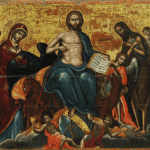
On Thursday I went to get the car back from the towing company’s lot. My friend took the morning of her day off to drive me, chatting reassuringly about how everybody gets in an accident within the first six months of having a car.
We drove off the main road to find the towing company. I can’t find words to describe how quickly northern Appalachia turns rural, once you drive off the main road. One moment you’re in a world of rust and semi trucks along the Ohio, and the next, you’re in the mountains. Every road is a squiggle that’s not quite wide enough, crossing back and forth over the same brown tributary on bridges that don’t look very sturdy, past shale cliffs and picturesque farmsteads under a warm green canopy. There’s no gas station parking lot to turn around in, no driveways that aren’t gravel. There’s no way of telling how close you are to the highway. Sometimes a buzzard or a wild turkey runs out at you, fearless. It’s truly awesome in the old, non-colloquial sense: equal parts beautiful and frightening.
The towing company was a Crusader’s Cross of gravel roads through a couple of acres of grass; there were apple trees, a motorhome and a small house, as well as a collection of tow trucks and wrecked cars. I found the Neighborhood Trolley tucked away beside the wreck of a jeep long before the proprietor came sauntering down the hill to put the spare tire on it. I drove on the spare tire all the way back to the main road, to Wellsburg, prayed in a garden of tacky statues at a Catholic church while the tire was being replaced, and then drove back in a vehicle good as new, except for an ugly dent on one side. I like Wellsburg. It feels like a town out of a storybook.
On the way home I took a drive through a few different towns. I found the neighborhood where we almost moved to a few years ago, respectable foursquare houses neatly lined up on the side of a great big hill like rosettes on a wedding cake. I drove past an Orthodox church with a dome made of Ohio Valley steel instead of gold, and the Byzantine Catholic church where we tried to belong for a time. The pastor there calls my blog “grave scandal.” The usher likes to get on social media, misspell my name and tell everyone how mentally ill I am, as if it isn’t obvious. But it really is a beautiful church.
I was sorry to go home to LaBelle.
On Saturday, our menacing neighbor flew into a fury and assaulted us when we wouldn’t answer her shouted questions about what had happened to our car.
She’s often complained to everyone who will listen about our car. She thinks we shouldn’t have spent any money on a car, rather than on sprucing up our house and making it more expensive-looking. It’s not our house, it’s the landlord’s house, and sprucing it up is the landlord’s responsibility. The landlord bought this house for fifteen thousand dollars when it was a derelict crack house and brought it up to code– he was still finishing a few last minute repairs when we moved in, grateful to have avoided homelessness, dragging our belongings in trash bags. Occasionally during the first few months, addicts would knock on the front door and then let themselves in if I forgot to lock it. Our neighbor bought the house next door for ten thousand dollars– I found out as much with a title search. She thinks that our eyesore of a rental is the reason she can’t flip her house for much more than ten thousand. She doesn’t understand that she can’t sell her house because nobody wants to live in LaBelle.
I heard her stalking around her house, yelling at nobody, for hours after the police left. Later that night, Michael and Rosie heard her cackle maniacally. I knew she was rejoicing in some wickedness she’d done, but I didn’t know specifically what.
On Sunday, going to Mass, I discovered the big long key mark in the side of the car facing toward the street: the good side, the side that wasn’t dented in the accident. I parked much further up the street that night to keep the car safe from further mischief.
At about four on Monday morning, I heard the neighbor go out with her German shepherd on a jangly chain, and wondered where she was going.
In the morning, I discovered she’d slashed all but one tire. She’d been careful to get the brand new one.
There was no one I wanted to speak to less than a police officer, but I ended up doing just that. He asked if I could name anyone who would want to do this, and then he visibly shut down at the mention of our neighbor’s name. I recognized him as the officer who’d yelled at me and told me to “you have to get along” with our neighbor when I asked him to enforce the restraining order last May.
“Let me know if you find a witness,” he said sharply, and drove off.
I wish to God I had a witness.
I guess that’s as good a name as any for what I do. I am a witness.
I am a traumatized person of no importance in a traumatized neighborhood of no value, in one of the most notorious towns along this worthless, traumatized stretch of the Ohio. I witness things, and I write them down.
I’ve read and seen caricatures of Northern Appalachia, but I’ve rarely seen an honest portrayal. So I bear witness, and the witness is true.
Are the horror stories you’ve heard about Appalachia accurate? More or less, but they’re whitewashed and oversimplified. They don’t usually tell you that there’s a human being under all that silliness. They don’t tell about kindly people like the Baker Street Irregulars and the volunteers at the Friendship Room: not missionaries patronizing us but Appalachians working for the good of Appalachia. They don’t delve into the generational trauma, the systematic abuse that makes people act in the irrational-seeming ways that they do.
Is it almost Heaven? Not in the least.
Is it Hell? Frequently. But any place can be hell.
Is it beautiful? Yes, sublimely so, in a way that will haunt you forever.
It’s also a nightmare, and if I ever get out of here I won’t miss it.
All of those can be true at once, about this and many places.
Image via Wikimedia Commons
Mary Pezzulo is the author of Meditations on the Way of the Cross and Stumbling into Grace: How We Meet God in Tiny Works of Mercy.
Steel Magnificat operates almost entirely on tips. To tip the author, visit our donate page.













